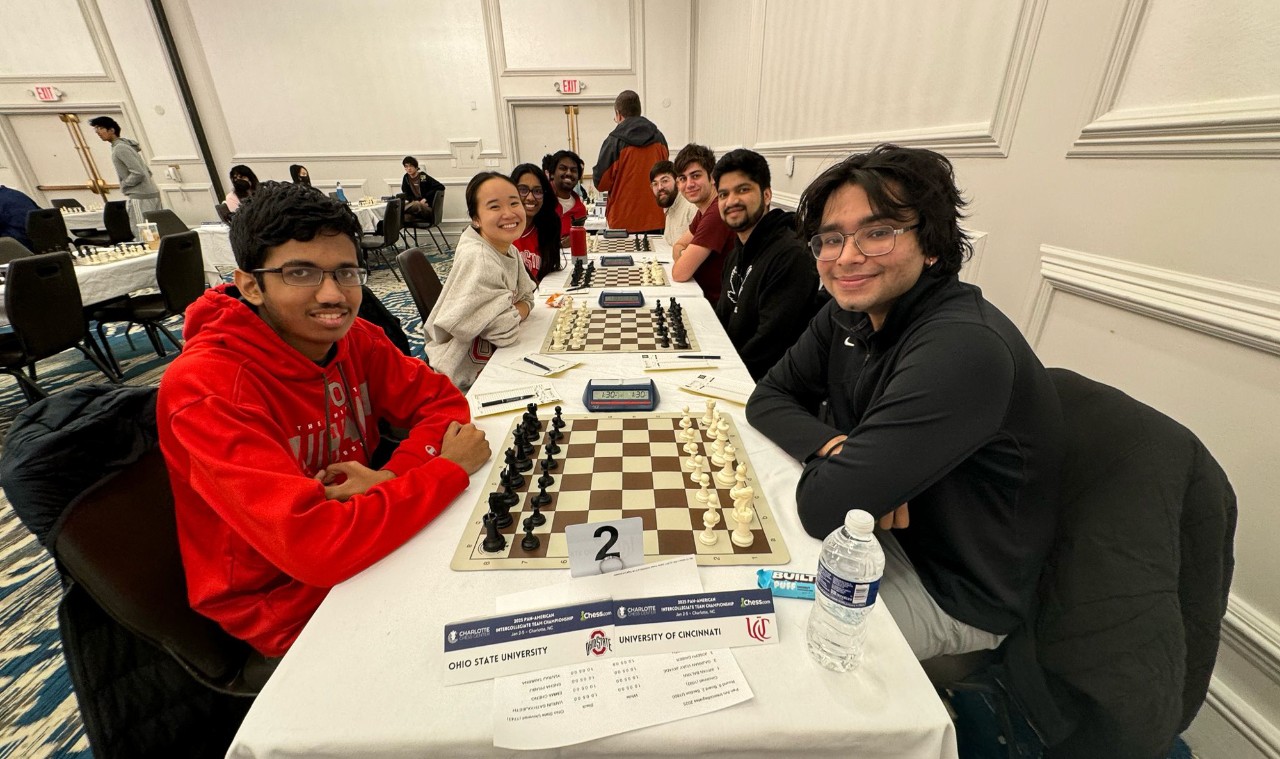
UC chess team has all the right moves
Bearcats beat 46 other teams at the Pan-American Collegiate Tournament
While some students moving to a new city might scout the best restaurants or the closest supermarket, Aryan Balyan looked for a place where he might play chess.
The University of Cincinnati engineering student moved to Spain in January to begin his third co-op job. But it didn’t take long to find an outlet for his other passion.
Balyan led UC’s chess team to the national championship in their division at this year’s Pan-American Collegiate Tournament.
Balyan and three other students from UC’s chess club competed against 46 other college teams in the Charlotte, North Carolina, tournament, which features both an open division and a division for teams like UC’s with a combined average ranking under 1800.
The team lost one of its early rounds against the University of Washington but bounced back by winning three consecutive rounds before toppling Ohio State University for the championship trophy.
“It was a great event. I hope it can help bring chess culture back to UC,” said Balyan, the club president.
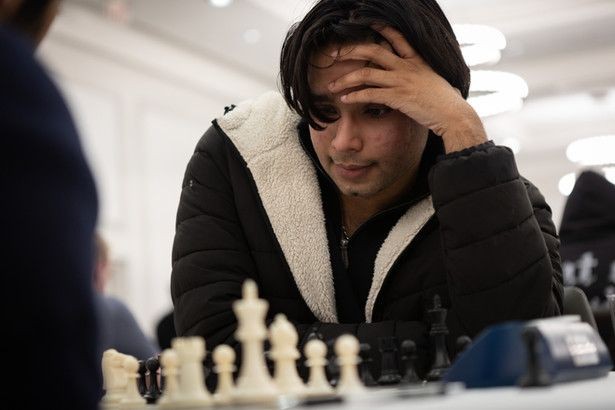
UC College of Engineering and Applied Science student Aryan Balyan led his chess team to victory at the Pan-American Collegiate Tournament. Photo/Provided
Balyan is working full time in the Basque Country this semester, getting real-world experience in neural networks while pursuing a computer science degree in UC’s College of Engineering and Applied Science. Through co-op, students at UC divide their time between classroom instruction and full-time employment in their chosen field.
“I came to UC because of the co-op program. It seemed too good to be true. But it’s just fantastic,” he said.
Balyan was only in Spain a couple days before he found a local chess club and signed up to play in its weekly tournaments.
“There’s a good chess culture here,” he said.
When I get stressed, I play a game of chess and it distracts me from life’s issues.
Gajanan Jayade, UC College of Engineering and Applied Science student
Invented in India more than 1,200 years ago, chess is a two-player board game with 32 pieces arranged on a grid of 64 alternately colored squares. But the elegant simplicity of chess contains multitudes of outcomes — so many that they have never been described.
To appreciate its complexity, just ask team member Joseph Daiber, a math major in UC’s College of Arts and Sciences.
“If you took every atom in the universe and gave each its own subuniverse and counted all of those atoms, chess would still have a quintillion times more possible game outcomes,” Daiber said. “Yet it’s still technically a solvable game.”
Even today’s supercomputers can’t calculate all the possible game iterations, he said.
“It’s impossible. There aren’t enough electrons to store that much data on a memory chip,” he said.
“There’s definitely a strong correlation between chess and math,” Daiber said. “Being good at math has made me better at chess.”
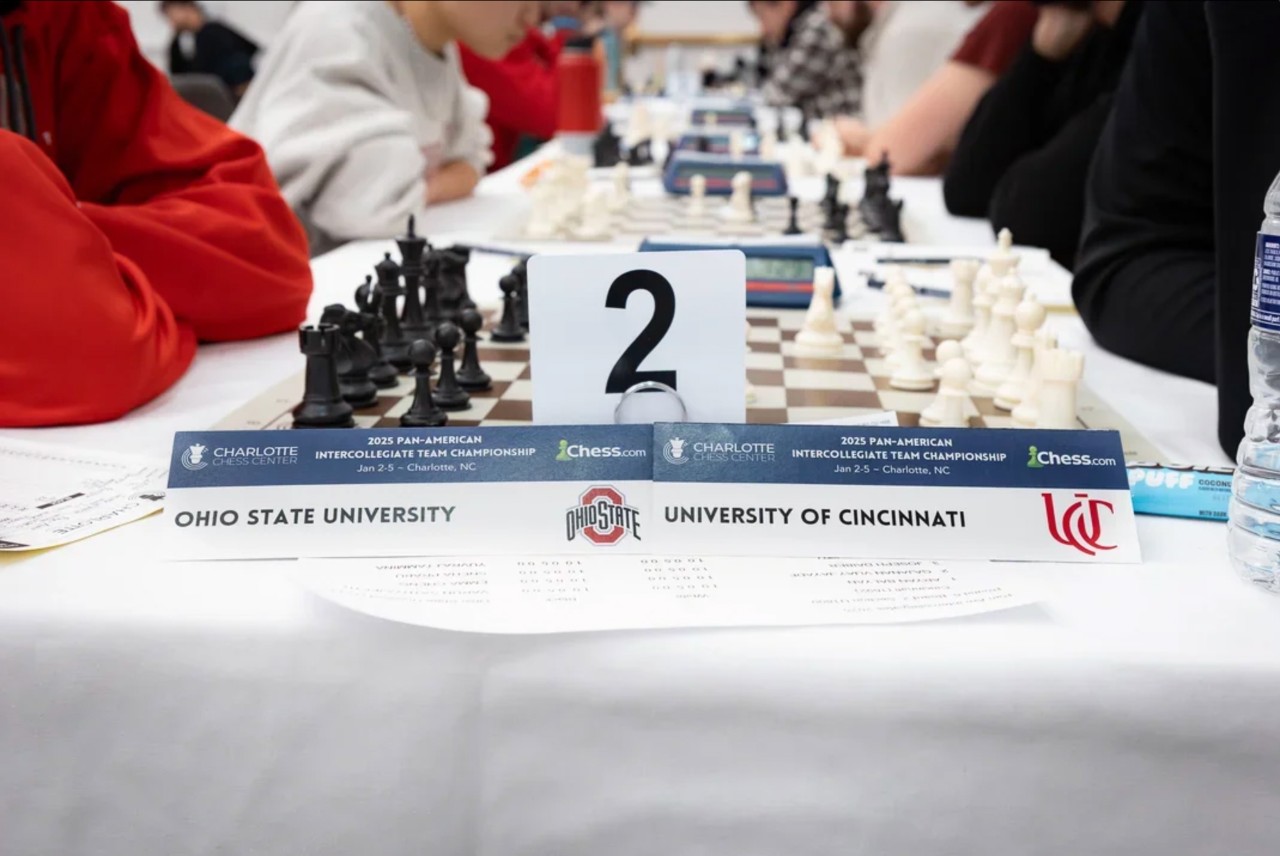
UC's chess team meets weekly at Swift Hall. New members are welcome. Photo/Provided
Balyan follows the exploits of his favorite chess players the way Major League Baseball fans can recite batting averages. His favorite player is five-time world champion and Indian grandmaster Viswanathan Anand.
But he respects other players such as Garry Kasparov and Magnus Carlsen, whose peak chess rating of 2882 is a record.
“The way Magnus plays is unreal. I’ve seen him create water from stone,” Balyan said. “He leaves a trail of disruption behind him.”
Balyan has rubbed elbows with some of the biggest names in chess. Playing in one tournament, he noticed that seated next to him was U.S. grandmaster Fabiano Caruana, the No. 2 player in the world. After making quick work of his opponent, Caruana turned in his seat to watch Balyan finish his game.
“Sadly, I blew it. I played to a draw in front of him with live commentary on the game,” he said.
Losing is part of the game but not a regular part of Balyan’s game. He has the UC team’s highest rating of 2180, putting him in elite company.
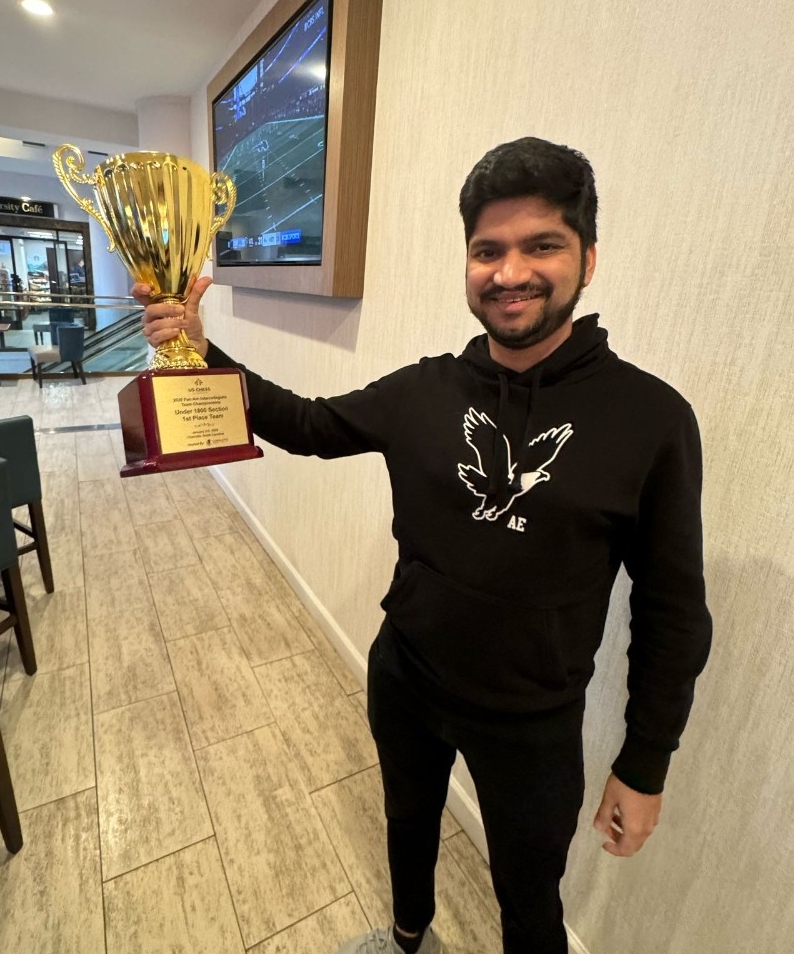
UC College of Engineering and Applied Science student Gajanan Jayade began playing chess at age 7. Today, he coaches other players. Photo/Provided
The game is often passed down by older generations in families. Balyan’s father taught him how to play.
Daiber’s late grandfather taught him when he was a child. And he still fondly remembers playing with him.
“When I think back, the only memories I have of him are playing chess. That’s the reason I love it so much. It feels like a way to connect with him,” Daiber said.
UC student Gajanan Jayade’s father taught him the game at age 7.
“It’s not that unusual to learn it that young. There is so much awareness about the game, so many kids learn it,” said Jayade, who is earning a master’s degree in materials science in UC’s College of Engineering and Applied Science.
But not many kids are as serious about chess as Jayade would become. At age 12, he began taking chess classes. As an adult, he started teaching chess students and launched a chess academy.
Today, he is a professional chess player in the U.S. Chess Federation ranked in the 98th percentile of the world’s ranked players. Top players earn six figures per year in tournament prizes alone. But many, including Jayade, supplement their earnings through coaching.
Jayade said he thinks about chess almost all the time and plays every day.
“Whenever I get a little break, I’ll start a new game on my phone,” he said. “When I get stressed, I play a game of chess and it distracts me from life’s issues.”
Tournaments require a surprising amount of physical endurance, Jayade said. A single game of chess can last five hours and burn more calories than a strenuous hourlong workout.
“I make it a habit to work out to keep myself fit to play better chess,” Jayade said.
“You’re physically exhausted after a tournament,” Daiber said.
Chess enjoyed a moment during the COVID-19 pandemic when people were looking for safe outlets to socialize and began joining online clubs. The renewed interest was driven in part by the blockbuster 2020 miniseries “The Queen’s Gambit,” one of Netflix’s most-viewed shows.
“Everyone was at home and wanted to learn chess. Ironically, COVID helped chess in a big way,” Jayade said.
Some students at UC, too, turned to chess, restarting the university’s chess club that had been dormant for years. Today, nearly two dozen students meet Wednesday evenings at Swift Hall to compete against each other and other colleges.
Daiber said he is the weakest member of UC’s winning team but managed to eke out a draw against a player rated far higher in a match that lasted a grueling five hours.
“I went into the game expecting to get destroyed,” Daiber said. “It was the best game I ever played. And that’s what chess is all about. I didn’t even win and I felt on top of the world.”
Featured image at top: UC's chess team took home the national championship in their division of the Pan-American Collegiate Tournament. Photo/Provided
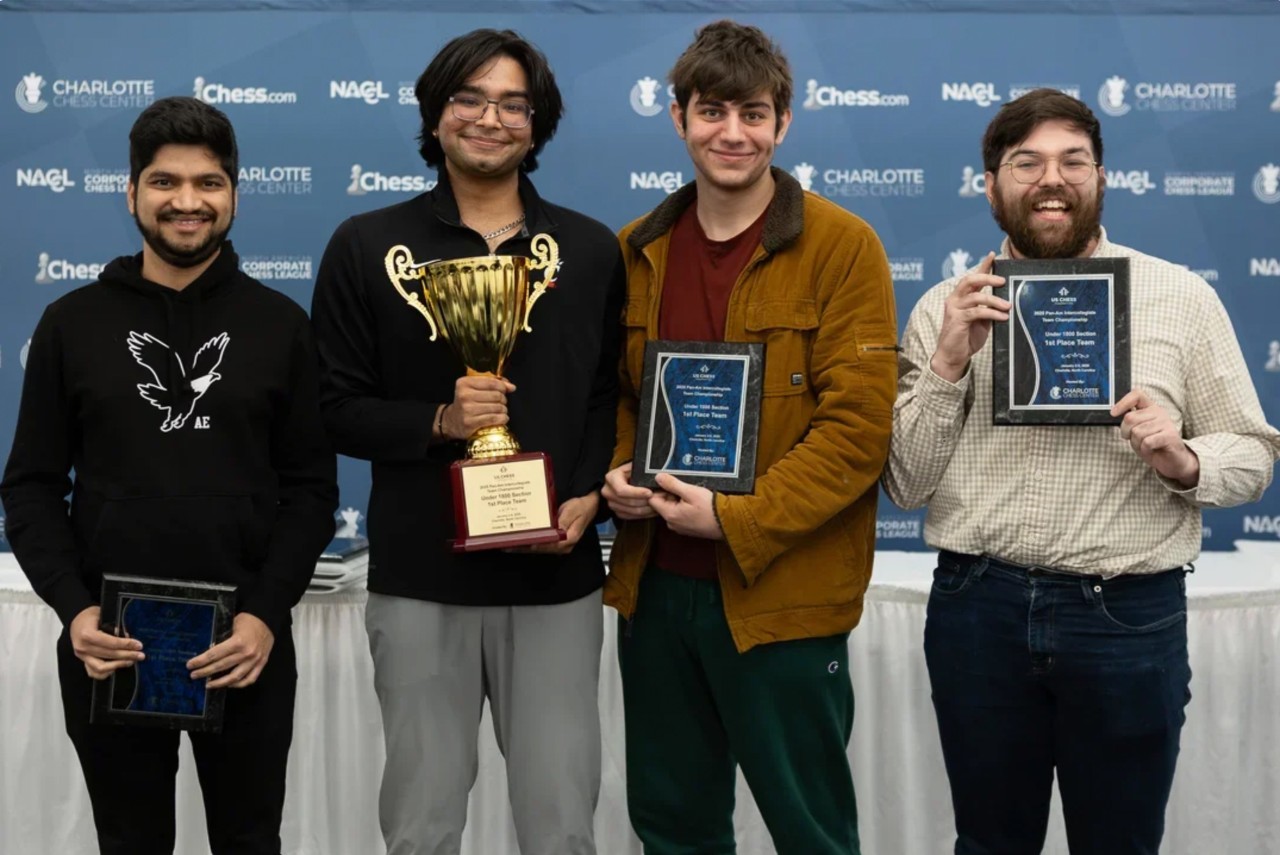
UC's chess team captured the Under 1800 championship at the Pan-American Collegiate Tournament in Charlotte, North Carolina. From left, the team consists of Gajanan Jayade, Aryan Balyan, Joseph Daiber and Joshua Smith. Photo/Provided
Beyond the Classroom
UC invented cooperative education more than 100 years ago, and we continue to innovate all aspects of experience-based learning, including internships, service learning, virtual co-ops, community projects and industry partnerships. Learn more.
Related Stories
Love it or raze it?
February 20, 2026
An architectural magazine covered the demolition of UC's Crosley Tower.
From research to resume: Grad Career Week prepares students for career paths
February 20, 2026
Graduate students at the University of Cincinnati will explore how their academic and creative work translates into professional success during Grad Career Week, March 2–6, a week-long series of workshops, networking opportunities, and skill-building sessions hosted by the Graduate College.
Discovery Amplified expands research, teaching support across A&S
February 19, 2026
The College of Arts & Sciences is investing in a bold new vision for research, teaching and creative activity through Discovery Amplified. This initiative was launched through the Dean’s Office in August 2024, and is expanding its role as a central hub for scholarly activity and research support within the Arts & Sciences (A&S) community. Designed to serve faculty, students, and staff, the initiative aims to strengthen research productivity, foster collaboration, and enhance teaching innovation. Discovery Amplified was created to help scholars define and pursue academic goals while increasing the reach and impact of A&S research and training programs locally and globally. The unit provides tailored guidance, connects collaborators, and supports strategic partnerships that promote innovation across disciplines.
